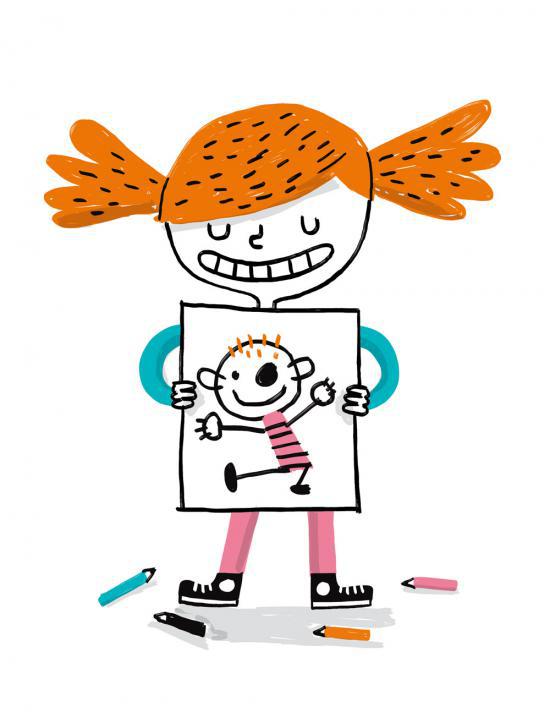
I like drawing. I don’t draw perfectly: I don’t always achieve what I want to, and sometimes I look at what I’ve drawn and I think “this is crap”.
But it doesn’t matter: I like drawing, so what?! I have a blast when I draw.
And since I would like my kids to have a blast as well, I’ve thought a lot about how I can communicate my passion to them. I have two kids who are truly ‘artistes’, who tend to doubt themselves a lot. Anxious temperaments, like their mom. It’s not easy to encourage their self-confidence as artists.
My girls produce about 3245 drawings per week. Their drawings invade the house, their backpacks, their bedroom walls, my office, and if I don’t watch out, they’ll soon be lining the sides of the cats’ litter box and the inside of the fridge cheese drawer. You would think they secreted drawings out of their pores, like dromedaries (you didn’t know that dromedaries secreted drawings, did you?)
It means that, in raving about their work, I’ve 1) developed cramps in my jaw and 2) discovered that the way that I react has a huge impact on their self-confidence.
I’ve discovered that for my girls “Your drawing is beautiful!” or “You’re so talented!” are anxiety-producing comments. It’s as if they’re scared that they’ll drop in my esteem if they mess up a drawing.
One day my youngest, who is a particularly stubborn drama queen (like her mom), started to panic because she thought that one of her drawings wasn’t good. She tore up her work and starting to cry, yelling “I’m no gooood!”.
That’s when I understood that the end result (my approval) had become more important to her than the activity itself. She no longer drew for pleasure: she drew to please. She tried to conform to the level of quality that she thought was necessary to maintain my approval. So that’s when I started to change how I reacted to her work.
Now when she comes to show me her drawings, I try to talk to her without expressing value judgments. I no longer say that her drawings are “beautiful” or “good”. I try to express appreciation for the pleasure that she experienced in drawing, the effort that she put into it, and the risks that she took. I want my comments to bring her back to what she herself likes in her drawings.
I discovered that comments formulated as questions are particularly effective in encouraging my daughter to talk about her process, what she’s proud of, and how she wants to improve.
Here are some examples of things that I say to my youngest when she shows me her creations. My objective is for her to understand that what is important to me is what she experiences in the drawing process, not the result achieved by the dazzling stroke of her pen.
-
This drawing is so detailed! Did you work really hard on it?
-
This purple sun is so original! Did you come up with this all by yourself?
-
I see that now you’re putting Manga eyes on your characters. Do you like the Manga style?
-
I heard you laughing to yourself when you were drawing Monster High. Did you have fun drawing it?
-
You used to have a hard time drawing hands, but now you can do it! Does this make you proud?
-
What’s your favourite part of this drawing?
And my favourite comment, which I get a lot of mileage out of, is:
-
I love watching you draw.
We live in a performance-based society in which the opinion of others takes on a disproportionate importance. If there’s one area in which a 5 year old should be free from the pressure to succeed, it should be finger-painting, right?
Well, that’s enough for today; I need to go clean the dromedary litter box.
